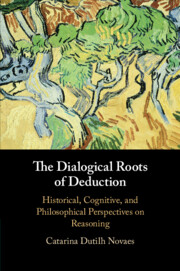 The Dialogical Roots of Deduction
The Dialogical Roots of Deduction Book contents
- The Dialogical Roots of Deduction
- The Dialogical Roots of Deduction
- Copyright page
- Contents
- Figures
- Preface
- Part I The Philosophy of Deduction
- 1 The Trouble with Deduction
- 2 Back to the Roots of Deduction
- 3 The Prover–Skeptic Dialogues
- 4 Deduction as a Dialogical Notion
- Part II The History of Deduction
- Part III Deduction and Cognition
- References
- Index
1 - The Trouble with Deduction
from Part I - The Philosophy of Deduction
Published online by Cambridge University Press: 10 December 2020
- The Dialogical Roots of Deduction
- The Dialogical Roots of Deduction
- Copyright page
- Contents
- Figures
- Preface
- Part I The Philosophy of Deduction
- 1 The Trouble with Deduction
- 2 Back to the Roots of Deduction
- 3 The Prover–Skeptic Dialogues
- 4 Deduction as a Dialogical Notion
- Part II The History of Deduction
- Part III Deduction and Cognition
- References
- Index
Summary
This chapter defines and introduces the explanandum of the book, i.e. the phenomenon (or phenomena) that it is about: deductive reasoning and argumentation. It presents deduction as having three main characteristics: necessary truth-preservation – which is perhaps the most central one, distinguishing deduction from other forms of inference and argument such as induction and abduction – perspicuity, and belief-bracketing. It also discusses a number of puzzling features of deduction, i.e. philosophical issues pertaining to deduction that remain open questions, as they have not yet been adequately ‘solved.’ These are: the range and scope of deductive reasoning and argumentation, the nature of deductive necessity, and the function(s) of deduction.
Keywords
- Type
- Chapter
- Information
- The Dialogical Roots of DeductionHistorical, Cognitive, and Philosophical Perspectives on Reasoning, pp. 3 - 21Publisher: Cambridge University PressPrint publication year: 2020


